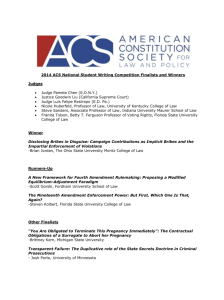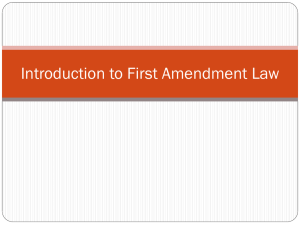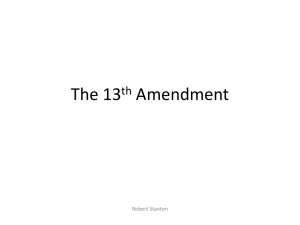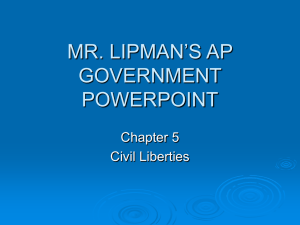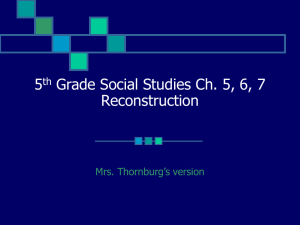Amendment 7: A Survey Of Florida Risk Managers
advertisement
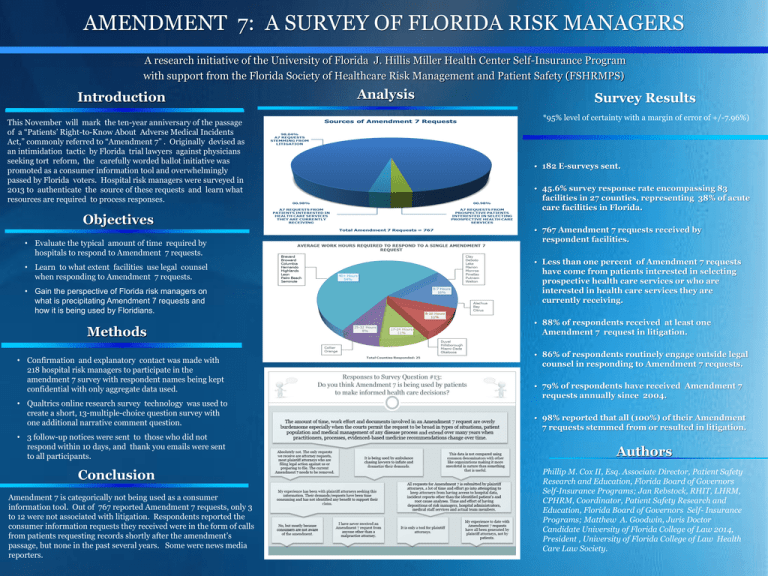
AMENDMENT 7: A SURVEY OF FLORIDA RISK MANAGERS A research initiative of the University of Florida J. Hillis Miller Health Center Self-Insurance Program with support from the Florida Society of Healthcare Risk Management and Patient Safety (FSHRMPS) Introduction This November will mark the ten-year anniversary of the passage of a “Patients’ Right-to-Know About Adverse Medical Incidents Act,” commonly referred to “Amendment 7” . Originally devised as an intimidation tactic by Florida trial lawyers against physicians seeking tort reform, the carefully worded ballot initiative was promoted as a consumer information tool and overwhelmingly passed by Florida voters. Hospital risk managers were surveyed in 2013 to authenticate the source of these requests and learn what resources are required to process responses. Objectives • Evaluate the typical amount of time required by hospitals to respond to Amendment 7 requests. • Learn to what extent facilities use legal counsel when responding to Amendment 7 requests. • Gain the perspective of Florida risk managers on what is precipitating Amendment 7 requests and how it is being used by Floridians. Methods • Confirmation and explanatory contact was made with 218 hospital risk managers to participate in the amendment 7 survey with respondent names being kept confidential with only aggregate data used. • Qualtrics online research survey technology was used to create a short, 13-multiple-choice question survey with one additional narrative comment question. • 3 follow-up notices were sent to those who did not respond within 10 days, and thank you emails were sent to all participants. Conclusion Amendment 7 is categorically not being used as a consumer information tool. Out of 767 reported Amendment 7 requests, only 3 to 12 were not associated with litigation. Respondents reported the consumer information requests they received were in the form of calls from patients requesting records shortly after the amendment’s passage, but none in the past several years. Some were news media reporters. Analysis Survey Results *95% level of certainty with a margin of error of +/-7.96%) • 182 E-surveys sent. • 45.6% survey response rate encompassing 83 facilities in 27 counties, representing 38% of acute care facilities in Florida. • 767 Amendment 7 requests received by respondent facilities. • Less than one percent of Amendment 7 requests have come from patients interested in selecting prospective health care services or who are interested in health care services they are currently receiving. • 88% of respondents received at least one Amendment 7 request in litigation. • 86% of respondents routinely engage outside legal counsel in responding to Amendment 7 requests. • 79% of respondents have received Amendment 7 requests annually since 2004. • 98% reported that all (100%) of their Amendment 7 requests stemmed from or resulted in litigation. Authors Phillip M. Cox II, Esq. Associate Director, Patient Safety Research and Education, Florida Board of Governors Self-Insurance Programs; Jan Rebstock, RHIT, LHRM, CPHRM, Coordinator, Patient Safety Research and Education, Florida Board of Governors Self- Insurance Programs; Matthew A. Goodwin, Juris Doctor Candidate University of Florida College of Law 2014, President , University of Florida College of Law Health Care Law Society.
